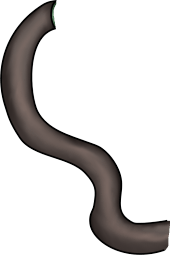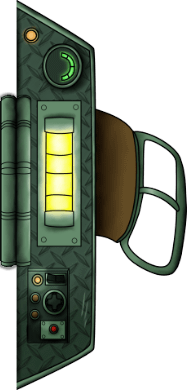The Mercenaries’ Tale – 1.01 Galitions
-Sean.
Far away from this vast expanse of nothingness, past asteroid belts, nebulas, entire star systems and other heavenly bodies, on the other side of the galaxy was a far more chaotic region of space.
The galaxy is a large place. There are so many stars, moons and solar systems that at some inevitable point the question arose as to what one might call the resulting sections once somebody finally got around to dividing space into pieces. After all, the great landmasses were divided into countries to highlight what one overly greedy king or emperor could call his own and show off exactly how much land was theirs while planning which bit they’d rather fancy sticking a flag into next. Space wasn’t quite so easy to claim due to how it wasn’t quite as tangible as an island, but the various species and colonies that started to branch out from their own little worlds really wanted to know which parts were friendly and which parts they should only venture into if they wanted to be riddled with laser fire.
The term 1“galition” arose among the intergalactic explorers and was adopted by the cultures they came into contact with simply by the virtue that no one had ever named space in a territorial manner before. Through a very long process of intergalactic osmosis, the galaxy was split up into five separate galitions. The most prominent of these stood out as one of the leading powers when it came to galactic politics.
Here, stars spiralled out on one of the many arms of the galaxy. In the midst of this arm sat a small solar system littered by the usual spatial debris ranging from the natural asteroids and planetoids to man-made satellites, station terminals and jump points where a ship could catch a ride on a hyper-spatial warp tunnel that would allow them to traverse entire star systems in the space of mere minutes rather than the years and decades it would normally take.
Towards the centre of this system were two planets, one with an atmosphere littered with satellites and space junk, its bulk forever blocking the second from receiving any light from the sun the two orbited. This behaviour had earned them the nicknames the ‘Planet of Light’ and ‘Planet of Darkness’ respectively2.
Both planets were brimming with the hustle and bustle of lively societies of life forms, despite the fact that the Dark Planet’s orbit should have left its surface cold and desolate. In fact, if it wasn’t for aether then the Dark Planet would never have been able to sustain any kind of life.
Aether is the stuff of magic: the mystical fifth element3, an indefinable substance that brings stability to the universe. It was very hard to describe its properties and even harder to pinpoint, causing many scientists to flat-out deny its existence because it was cluttering up their nice neat formulaic science with things like anomalies, mysticism and, that worst of admissions, “we just don’t get it”. Like light, none who studied it could decide if it was classified as a particle or a wave but unlike light it did as it pleased. Its movements were erratic; the rules regarding it were constantly shifting. The only vague consistency was its habit of clinging to objects and living things, and even that was not a provable fact.
In terms of application, magic is like art: some people take years to study to become a great painter, toiling day and night to perform the perfect brushstroke, struggling to grasp the most profound perspectives and composition. Then there are those that prove to have a ‘special talent’ and can create the most dazzling masterpiece of the century at age ten. The average magical user would only truly reach the level of ‘mage’ when they reached their fifties, after a lifetime of reading ancient scrolls and tomes to the point where they’d never really lived at all and had become that person with the squint in their right eye and permanent 11 o’ clock shadow who lives in that dingy basement with all those cats and smells a bit funny (especially the women), although the magical community called that sort of behaviour dedication.
Other mages found that they were naturally gifted and could create fireballs from the get-go; these mages were commonly and often rightfully loathed by the rest of the community. Finally, there were the mages that took to artificially increasing their power and ignoring studying all together, dismissing it as too time-consuming. However, in the end the key ingredient to becoming a mage was learning to sense and manipulate aether4 wherever it could be found, and in doing so they could perform the most wondrous things; from throwing fireballs to parting the seas.
The Dark Planet had an uncanny talent for attracting aether, large deposits forming across the planet’s surface allowing all manner of plant and animal life to exist. Unsurprisingly, magic became a large influence to the Dark Planet’s civilisations – the opposite of the denizens of the Planet of Light, who coveted science and technology.
The Planet of Light, otherwise known as ‘Lusinia’ to its inhabitants, had once been a harbour of activity in the galaxy, a social hub that held multiple trade routes and holiday destinations for other planets. The Planet of Darkness had always shied away from the spotlight. It was more akin to an awkward, younger sibling, the black sheep of the solar system if you will. Like most siblings, the two planets had gotten along reasonably well at first, sharing trade routes and defending each other whenever someone turned up to bully them. The Dark Planet didn’t hold any kind of grudge against its sibling despite literally living in its shadow, although there had always been minimal communication between the two. Their societies were based on very different ideals, Lusinia being home to modernistic cities that celebrated wealth, vice and the cult of celebrity whereas its planetary brother combined magic with technology to create a society that coveted what most of Lusinia would no doubt call outdated concepts such as codes of honour and ethics.
A rift began to form between the two, a feud growing within it like a forest of weeds. From Lusinia’s perspective, no one knew what exactly had caused it. There had been a complete breakdown in communication between the two planets by the time the Dark Planet launched its first attack.
The citizens of the more developed countries of Lusinia went into frenzy, their ignorance leaving them unsure as to how to react. They flocked to the intellectuals for answers, the unwashed masses having no idea if the “Dark Worlders” were definitely the ones who had instigated the attack or not. An official statement was issued detailing what had happened, although the exact details were something that was debated by conspiracy theorists for years to come. The official position stated that a fleet of Dark Worlder ships had attacked an airbase belonging to the Planetary Special Forces, the Lusinian military, placed outside the city of Clawdugan which resided on the eastern coast of the Lusinian central continent. After causing severe damage to the unprepared base, the fleet took to attacking the city, the death toll reaching several hundred.
Lusinia was outraged by the news and quickly prepared a retaliatory attack. Events escalated from there into a war spanning over three decades, on one side the technologically advanced Planet of Light, and on the other was the mystical, thieving Planet of Darkness who took to scavenging any technology superior to their own and magically upgrading it for their own ends.
Over the years, the two planets collided in hundreds of proxy battles, each resulting in thousands of casualties but neither side were ever the victor: stalemate after stalemate occurring again and again, reaching out towards the only possible conclusion to this bloody war…
- The keener of you have probably worked out that this is simply the merging of the words ‘galaxy’ and ‘partition’ together. Pioneers and founders aren’t that good at naming things when all is said and done: just think of the amount of place names that are taken from other places but with the word ‘new’ in front of it. ↩
- See what we mean about explorers and pioneers? Very original! ↩
- Some people still insist on calling this element ‘surprise’. ↩
- This is a bit like handling metaphysical slop with hands made of small forks only using those muscles that some people use to make their ears waggle. In short, very difficult, but I bet you’re trying to waggle your ears right now anyway. ↩
Post by Sean Patrick Payne | October 10, 2013 at 8:49 pm | The Mercenaries' Tale | No comment
Tags: Aether, Dark Planet, Galition, history, Lusinia, Planet of Darkness, Planet of Light, Planetary Special Forces, PSF






